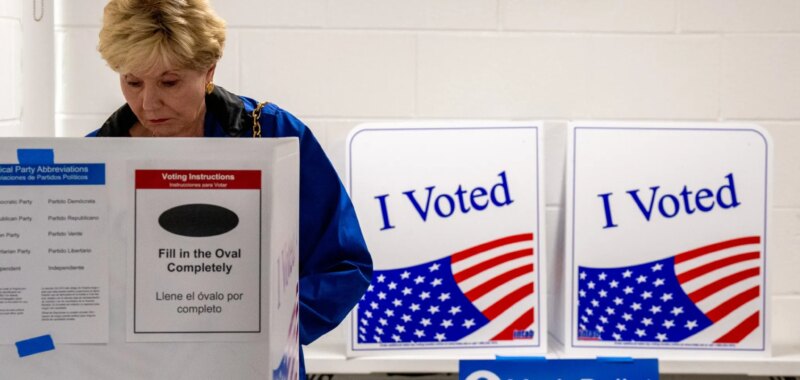
With just five weeks remaining until the election of the 47th U.S. president, more than half of Americans say protecting Medicare and reducing health care costs are among the most important issues influencing their choices at the ballot box, a new survey finds. What’s more, two-thirds of respondents think health care isn’t receiving enough attention in the 2024 campaign.
Analytics firm Gallup and West Health, a group of nonprofits focused on aging and health care, polled more than 3,600 U.S. adults 18 and older on health care issues. The results of the survey, given Sept. 9–16, were published Sept. 30. Roughly 1,300 people were surveyed after the Sept. 10 debate between former President Donald Trump and Vice President Kamala Harris, but the polling methodology indicates little variation in respondents’ attitudes before and after the debate.
Survey participants reported candidates’ positions on the following health care issues were the “single most important” or “among the most important” factor(s) in determining their vote for president on Nov. 5:
- Protecting Medicare/Social Security: 63%
- Reducing the cost of health care: 57%
- Lowering drug costs: 47%
- Policies related to mental health care access: 43%
“Americans remain concerned over high health care prices and the future of Medicare and Social Security—even though other issues dominate during this election cycle,” Timothy Lash, president of the West Health Policy Center, said in a news release about the poll. “This is especially true for older Americans, a significant voting bloc.”
Majority of Democrats, Republicans want to protect Medicare
What respondents considered to be the single most important issue and among the most important health care issues varied by age and political party.
Perhaps unsurprisingly, the importance of protecting Medicare and Social Security increased with age, with the vast majority of people 65 and older (84%) marking it a top issue, followed by nearly three-fourths (73%) of those aged 50 to 64 and half (50%) of those under 50. Though the issue was most important to Democrats (73%), it also mattered to majorities of Republicans (58%) and independents (61%).
People 65 and older were most likely to rank the other three issues of top importance, too. They came closest to another age group in policies related to mental health care access, with the oldest adults (44%) just outpacing those under 50 (43%).
Democrats had the most representation in each of the four issues, the highest being reducing the cost of health care (75%). Aside from protecting Medicare and Social Security, Republicans didn’t reach a majority in any category, the lowest being policies related to mental health care access (30%). Independent voters hovered between Republicans and Democrats on each issue.
Health care not getting enough election coverage—especially to Dems
With so many policies—from affordable housing to education and immigration—at the forefront of the fight between Trump and Harris, most Americans (67%) don’t think health care has been getting “enough attention.”
The pattern holds true for all parties:
- Democrats: 78%
- Independents: 67%
- Republicans: 53%
Republicans, though, were most likely to say health care was getting “the right amount of attention” (35%) or “too much attention” (12%).
“Americans across all political stripes want to know where candidates stand on these critical issues and do not think they’ve heard enough yet,” Lash said. “It will be interesting to see how the candidates and political parties address this.”
Republicans, independents more pessimistic about health care affordability
Just as Democrats were most likely to say reducing the cost of health care is a top issue, they were also most likely to say access to affordable health care will improve within five years. More than half (58%) said improvement was “very” or “somewhat” likely.
About a third of independents (36%) showed the same optimism, as did an even smaller proportion of Republicans (31%). Overall, more than half of respondents (59%) said improvement was “not very likely” or “not likely at all.”
A third of voters don’t trust Trump or Harris on health care
As you might expect, Republicans were most trusting of Trump on the health care issues polled, while Democrats were most trusting of Harris and independents were somewhere in between—though Dems’ trust in Harris outweighed Republicans’ in Trump on each issue.
While independents favored Harris, particularly when it comes to protecting or strengthening Medicare, about a third don’t trust either candidate. Independents showed the most distrust (37%) in the candidates’ abilities to increase the quality of health care.
For more on healthy aging:
Subscribe to Well Adjusted, our newsletter full of simple strategies to work smarter and live better, from the Fortune Well team. Sign up for free today.

